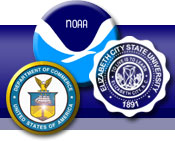This
program is designed to improve the educational capabilities
of ECSU and to attract students into the field of remote
sensing. The use of satellite imagery is a growing field
and is used in an array of applications by scientists in
all NOAA line offices. Techniques are rapidly evolving and
have broad application to NOAA’s mission. It would
be beneficial to start now to encourage future scientists,
technicians or entrepreneurs to develop skills in this field.
The
proposed program would take advantage of equipment and expertise
at ECSU’s recently established Center of Excellence
in Remote Sensing Education and Research (CERSER). The Center
is a collaborative effort with contributions by: a) The
Office of Naval Research (ONR), b) Elizabeth City State
University (ECSU), c) The MU-SPIN Office of Goddard Space
Flight Center (GSFC), d) NOAA headquarters, e) Pixoneer
Corporation, and f) SeaSpace, Inc.
NOAA
scientists at all levels of the agency are strong supporters
of efforts to encourage the education of minority students.
Many scientists would like to be in a position to take students
as summer interns, but few can make the commitment to do
so. A major problem is that training and guiding an intern
can be a drain on a scientist’s time rather than enhancing
his/her productivity. Also, many scientists are understandably
reluctant to accept an unknown student with unknown skills
into a well-honed research team
We
seek to improve on the usual internship process, so that
the students would be better prepared to contribute to the
research effort. We do this in two ways. First we begin
the relationship between student and scientist early. Potential
supervisors would be invited to give a guest lecture on
campus, and students would spend two days shadowing a researcher
at NOAA’s laboratory in Beaufort, NC. This early contact
between potential supervisors and interns can remove some
of the biggest barriers to choosing to pursue an internship.
Not only would the student be able to visualize the work
she/he would do, but she/he would have a sense of the personality
of the supervisor as well. This should reduce the anxiety
of committing to a summer away from home. Likewise, potential
supervisors would be able to meet and assess interns before
making a commitment to take one on for the summer.
Second,
we would teach the skills the students would need for their
specific internship project. Persons wanting interns would
be asked to identify by the fall term the specific skills
the students would need during the summer. Students would
develop these skills while working in research teams on
campus with the mentors and the program manager.
The proposed program would expand on this collaboration
by strengthening ECSU’s ability to train students
in the use of remote sensing techniques to characterize
the behavior of protected species. Funds would be used to
give students formal training during the school year and
practical experience through summer internships. We would
provide a stipend and housing expenses so students can gain
practical research experience during the summer.
An
entrepreneur is a person who sees a need and provides a
service to address that need. In its broadest context, entrepreneurs
do not need to engage in commercial activities—a scientist
applying for a grant has identified a scientific need and
seeks to provide a service. She/He has many characteristics
of an entrepreneur in terms of taking initiative, calculating
risk and organizing people and activities to add value to
society. To help students develop an entrepreneurial spirit,
we would require potential interns to attend two half-day
seminars in critical thinking and entrepreneurship organized
by the Small Business and Technology Development Center
on ECSU’s campus. We would encourage them to view
the laboratory in which they intern as a client. We would
specifically encourage entrepreneurship by providing continued
scholarship help and summer stipends to students who wish
to continue with their research projects, provided that
they submit a grant proposal and maintain at least a 3.0
grade point average. The proposal would have to articulate
the need of the laboratory and the service the student would
provide. A letter of support from the NOAA agency would
be required as a part of the student’s proposal.
We
would provide training in entrepreneurship and creative
thinking. By allowing students to write proposals for a
second year of research with a supervisor, the project would
encourage students to take initiative in their schooling
and would provide opportunities for students who really
want to continue in this field.
Providing
an opportunity for students to continue to work in this
field after their first year internship has several important
advantages: 1) Second year students will be even more useful
to the scientists they work with. 2) The proposal format
requires students to take initiative and rewards those who
do so. 3) The program would encourage student who are most
interested in remote sensing techniques to stay in the field.
We
propose to recruit students into this program by offering
a scholarship of $3000 for each year of participation. Accepting
the scholarship will commit the students to work during
the school year to develop their skills in using remote
sensing techniques, to attend required lectures and training
and to spend 8 weeks of their summer in their paid internship.
The scholarship is a substantial fraction of the costs of
attending ECSU and is expected to generate interest among
the best student in math and science.
In
this program, we deliberately aim to provide intense training
and counseling to a small number of students. We believe
that this is a more effective approach to persuading students
to make a career in the field of remote sensing than a training
program that reaches more students but provides less contact.
Our observation is that the personal relationships with
role models have great impact on affecting career choices.
Also, the more time a student invests in learning a subject,
the more likely the student is to continue to use the skills
acquired.

